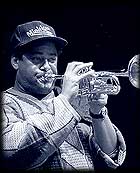
|
|
|
|
|
|
Photo Credit: Tim Owens |
Jon Faddis
The trumpet is one of the signature instruments of jazz: proud, brassy and capable of some of the more incendiary expressions of the music. No one more closely embodies those jazz trumpet qualities than Jon Faddis, who joins Billy Taylor for this installment of Billy Taylor's Jazz at the Kennedy Center. A native of Oakland, California, Faddis was introduced to jazz at an early age. He admits he was one of those rare pre-teen children who by-passed the playground in favor of the pursuit of music. Dr. Taylor and Faddis also talk about the evolution of Jonís career, right up to his current position as director of one of the leading repertory jazz ensembles, the Carnegie Hall Jazz Band. Faddis first arrived on the New York jazz scene at the relatively tender age of 18. His trumpet prowess quickly led him to work with such prominent big bands as those of Lionel Hampton, and the Thad Jones-Mel Lewis Orchestra. Faddisí unique sound, music reading skills, and enormous capacity on his instrument also brought him lucrative work in New Yorkís numerous recording studios. One thing that separates Faddis from other trumpet players is his tremendous range, particular in the upper registers. Dr. Taylor engages Faddis in conversation about this capability, which Jon sums up: "Between exercises and listening a lot to Dizzy [Gillespie], that helped me a lot with my upper register." Even as a youngster, Faddis seemed destined to be a jazz musician, as he practiced expanding his range through exercises at the age of ten, often during his school lunch breaks. Itís obvious throughout the show that Gillespieís influence extends beyond the musical sort. Faddisí tremendous sense of humor is reminiscent of Gillespieís good-natured love for a laugh. Faddis says he first met Gillespie as a pre-teen, during a period when he was busy emulating the bebop trumpet master. Faddisí parents nurtured and encouraged his musical pursuits, taking him to many jazz performances and often surreptitiously adding more jazz records to his collection. One outing to a show resulted in Jonís meeting his idol, Gillespie, who would later become a mentor and supporter as Jonís career took flight. Faddis also expounds on Gillespie's influence as a bandleader, which has carried over into Jon's leadership of the Carnegie Hall Jazz Band leadership. When Billy asks Faddis about the influence of masters like Louis Armstrong, Roy Eldridge, Dizzy and Miles Davis, Jon takes horn to lips to illustrate their respective styles and contributions. An audience question about Jonís performance at Dizzy's 75th birthday celebration at the Blue Note in New York elicits fascinating demonstrations of Faddis' use of various mutes and effects peculiar to jazz trumpet playing.
On the bandstand, Faddis plays wonderful versions of the bebop classic "Hot House", on which he demonstrates the beboppers' use of substitute chords. The Gillespie classic "Night In Tunisia" and Duke Ellington's indelible "Mood Indigo" are also among the brilliantly performed musical selections. Faddis prefaces his version of "Anthropology" with a funny anecdote from Gillespie about Charlie Parker. According to Gillespie, Birdís performance on the classic recording entailed playing all of the tune's notes, leaving the trumpeter to merely follow in his wake.
|
|
| |
